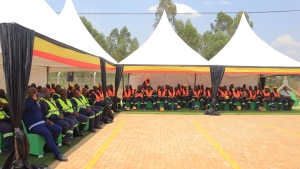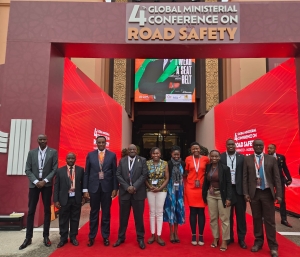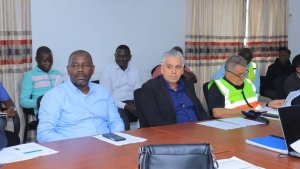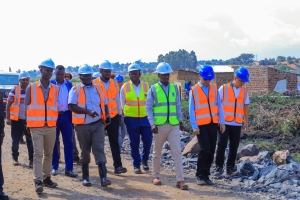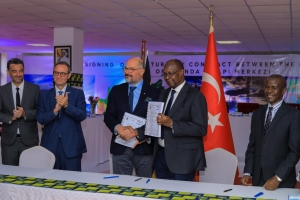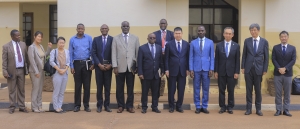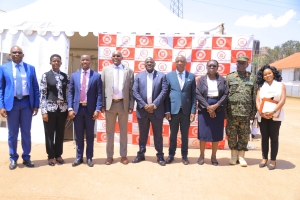The Automated Express Penalty System
With evolution of technology and the need for convenience, Government of Uganda initiative of the Intelligent Transport Management System (ITMS) is aimed towards creating a safe road environment.
The system integrates advanced technologies in monitoring, video surveillance, data analytics, control systems and communications to ensure the safety of citizens and optimal management of the transport sector.
Over the last ten years, between 2014 and 2024, the number of fatalities on our roads grew by 80.8% from 2,845 in 2014 to 5,144. 60% of the fatalities in 2024 involved vulnerable road users who were not in control of the vehicle, including passengers (1,307), pedestrians (1,666), and cyclists (138). Motorcyclists contributed (1,720) 33% of the total fatalities in 2023. When you include the passengers on motorcycles (614), the percentage is 47%. 17,013 people seriously injured in road accidents during the year 2024.
According to the Police Annual Crime Report 2024, the main causes of road crashes were careless overtaking (5657) and speeding (5505), accounting for 44.5%, almost half of all crashes. Following too close (1753) which came in at number 4 also has an aspect of speeding.
Ministry of Works and Transport reviewed and updated the Traffic and Road Safety (Speed Limits) Regulations, 2004 to enable the operationalization of the act passed by parliament. This was aimed at improving driver behavior among road users and to develop a safety culture to protect the most vulnerable road users especially the pedestrians and passengers that do not control the vehicle.
In this regard, an Integrated Transport Management System was developed with objectives that include managing crime involving vehicles and motorbikes, improve traffic control, improving road safety and remove duplicate registrations. The integrated system hence then is composed of digital number plates (Automatic number plate recognition), CCTV cameras (Speed and Red-light Enforcement), command centers, and database integration.
The automated Express Penalty System (EPS) that has therefore been developed to operationalize the penalty scheme regulations and the regulations include; penalties for driving over the prescribed speed limits, offences related to registration plates in line with the ITMS, wearing and fastening of crash helmets, use of child restraints and children under 5 years to seat at the back and using appropriate child restraints plus use of cameras to issue EPS.
The EPSAuto will be able to detect violations like over-speeding and running the red-lights, capture and process the vehicle or motorbike registration number plate plus the location, time and avail photo or video, generate an E-fine which is logged into the ITMS database against the violating vehicle or motorbike and verified by an in-charge police officer. The registered vehicle owner is hence notified by sms or email the type of offence, date committed, amount of fine, deadline for payment and reference number with the payment channels.
Fines for the automated EPS will have the opportunity to be cleared via mobile money platforms (Airtel and MTN), Banks, and POS, Online portals linked to the Uganda Revenue Authority or Police systems.
Non-compliance will face risks including vehicle impounding, accumulated unpaid fines, and denial of registration services, including court summons. The automated Express penalty system is expected to kick start operations on 23rd April 2025.
The Ministry of Works and Transport kicked off more engagements with all its stakeholders in the transport sectors in different forms that include commercial motorbikes (boda-boda riders) truck drivers among others.
METRAC - Uganda’s First Mechanical Engineering Training and Advisory Centre Successfully Concludes its Inaugural Training
The Ministry of Works and Transport proudly celebrates the successful completion of the inaugural Operator Training program at the Mechanical Engineering Training and Advisory Centre (METRAC) in Kakinzi, Luwero. This significant milestone was marked by an event attended by key stakeholders, trainers, and trainees alike, culminating in the graduation of 65 operators and mechanical supervisors from across Uganda.
The event was graced by esteemed guests, including a representative of the Honorable Minister of State for Works, the LC IV Chairperson, the Chief Administrative Officer of Luwero, a representative of the Engineer in Chief, and other senior officers from the Ministry, participants, and guests.
The operator training program, held over a period of two weeks, focused on road construction and maintenance equipment procured by the Government of Uganda from Japan. It covered essential skills in equipment care, operation, and management to enhance safety, productivity, and efficiency. The training is part of the Ministry’s broader effort to address the shortage of skilled operators, which has historically hampered the effective utilization of road construction machinery.
The trainees, representing 10 districts including Abim, Apac, Arua, Amuria, Amuru, Butaleja, Kayunga, Kyotera, Kasese, and Nabilatuk, successfully completed rigorous theoretical and practical sessions, acquiring the critical skills necessary for maintaining and operating road construction machinery. Their commitment to the program reflects their dedication to improving the infrastructure of their districts and contributing to the country's broader development goals.
The event’s guest speakers expressed their appreciation for the efforts of all involved, particularly the Ministry’s team and METRAC’s leadership, for their commitment to delivering quality training. They emphasized that the knowledge gained by the trainees would be a significant asset in ensuring that the country’s road network is well-maintained and managed efficiently.
The Chief Mechanical Engineer (CME), represented by Eng. Winfred Naluyinda, the Assistant Commissioner in charge of Inspection highlighted the importance of the three key elements that underpin success in the field: Man, Machinery, and Materials. The program was designed not only to provide technical skills but also to instill a sense of responsibility in operators regarding the care and maintenance of the machinery they work with. Effective management of these resources is essential to ensuring the longevity and productivity of Uganda's road infrastructure.
The Ministry of Works and Transport, through its partnership with the Government of Japan, continues to prioritize capacity building to improve the road construction sector. The establishment of METRAC is a critical step in strengthening the skills of operators nationwide. The training at METRAC aims to ensure that operators can maximize the use of the equipment, thereby increasing durability, reducing maintenance costs, and enhancing overall performance.
In line with this effort, the Government has introduced a mandatory annual training and certification program to ensure operators remain up to date with best practices and operational standards. As emphasized by the Training Center’s Principal, Ivan Watta, the correct handling and maintenance of equipment can lead to significant cost savings, potentially reducing road maintenance costs by up to 20% of the contract price.
As the trainees complete their certification, they are now equipped with the skills and knowledge to contribute meaningfully to the maintenance of the nation’s roads. The Ministry encourages them to apply what they’ve learned in their respective districts, ensuring that the machinery operates safely, efficiently, and with minimal downtime.
As the ceremony concluded, the successful trainees were awarded their certificates, marking the official end of the training program. The Ministry remains committed to ensuring the continued development of skills that are critical for the effective management of road equipment, and the success of this program is a shining example of what can be achieved when knowledge is shared and applied for the common good.
4th Global Ministerial Conference on Road Safety
At the 4th Global Ministerial Conference on Road Safety, held for the first time on the African continent, the theme "Commit to Life" resonated with the shared global commitment to making roads safer for everyone.
The conference, held between 18 and 20th February 2025 in Marrakech, Morocco, brought together leaders, experts, and key stakeholders to discuss actionable strategies, strengthen global cooperation, and promote road safety across the world. The event focused on critical areas such as road safety governance, emerging mobility trends, financing, and the active involvement of private sector and civil society organizations in road safety initiatives.
During the conference, the Government of Uganda was represented by the Hon. Minister of Works and Transport, Gen. Edward Katumba Wamala. He was accompanied by the Commissioner Transport Regulations and Safety, Katushabe Winstone, Road Safety Officers from the Ministry, and Road Safety Civil Society Players.
The Minister made several key commitments aimed at advancing road safety both locally and globally. He outlined a series of resolutions designed to improve road safety within Uganda and contribute to international efforts to reduce road traffic fatalities by 2030.
The Minister committed to strengthening legislation around traffic and road safety by updating and formulating comprehensive laws, regulations, standards, manuals, and guidelines. In addition, the government pledged to improve the management of road crash and road safety data, ensuring that better information guides policymaking and enforcement. Uganda also emphasized the importance of operationalizing mandatory motor vehicle inspections to ensure that vehicles on the road meet safety standards, thereby reducing the risk of accidents.
Further commitments included enhancing the motor vehicle data registry to support better planning, enforcement, and regulation of road transport services. The Minister also highlighted the need for improved coordination among road safety programs, agencies, and civil society organizations, including encouraging corporate social responsibility by the private sector in supporting road safety initiatives. Finally, the government committed to increasing funding for road safety programs to ensure that adequate resources are allocated for infrastructure, education, and enforcement.
These commitments are a significant part of Uganda’s ongoing efforts to improve road safety and align with global goals. The 4th Global Ministerial Conference on Road Safety was an important step forward, not only in reinforcing the international commitment to reducing road traffic deaths but also in demonstrating Uganda's determination to make its roads safer. With a continued focus on legislative reform, data management, vehicle safety, and inter-sectoral collaboration, Uganda is poised to make meaningful progress toward the target of halving global road deaths by 2030. Through these efforts, the Government of Uganda remains committed to ensuring that every journey on its roads is safer, with the ultimate goal of protecting lives and building a more sustainable road transport system.
One of the key outcomes of the conference was the strong emphasis on strengthening road safety governance, improving data collection and analysis, and leveraging new technologies to address the growing challenges posed by road traffic injuries and fatalities. Participants also discussed the vital connection between road safety and other Sustainable Development Goals (SDGs), underscoring the importance of integrating road safety into broader development efforts. A major highlight was Africa's role as the host continent, which brought special attention to the region’s unique challenges and opportunities in improving road safety.
Uganda’s Commitments at the Marrakech Conference;
At the 4th Global Ministerial Conference, the Hon. Minister of Works and Transport represented the Government of Uganda and made the following key commitments to support the global vision of safer roads:
- Strengthening Legislation: The government will continue to update and formulate comprehensive laws, regulations, standards, manuals, and guidelines to enhance traffic and road safety.
- Improving Road Safety Data Management: Efforts will be made to improve the collection, management, and use of road crash and road safety data to guide policy and enforcement decisions.
- Operationalizing Mandatory Motor Vehicle Inspections: The government is committed to enforcing mandatory vehicle inspections to ensure roadworthiness and reduce vehicle-related accidents.
- Improving Motor Vehicle Data Registry: The government will enhance the motor vehicle data registry to support better planning, enforcement, and regulation of road transport services.
- Strengthening Coordination of Road Safety Programs: Uganda will improve coordination among road safety programs and agencies, including encouraging corporate social responsibility from the private sector to support road safety initiatives.
- Increasing Funding for Road Safety: A commitment to allocate increased funding to support the implementation of road safety programs, ensuring that resources are available to improve infrastructure, education, and enforcement.
Phase One of the Construction of Kabalega International Airport Currently at 96% Completion
The construction of Kabalega International Airport, a key infrastructure project in Uganda’s oil and gas sector, is now 96% complete, with the official commissioning set for September 2025. The airport, located in Hoima District, is expected to play a pivotal role in facilitating the transportation of critical equipment to meet Uganda's 2025 oil production target.
The contract for the constructcion of the airport was awarded to a joint venture between Israeli-British firms Shikun and Binui International-SBI/Colas Limited, had initially planned to hand over the airport to the government last month. However, Buchbut Sharly, the Managing Director for SBI International, explained that additional time was needed to finalize key elements of the project, including the construction of the control tower, installation of electricity, CCTV cameras, fibre optic cables, and other essential operations.
A significant design change also contributed to delays: the airport was originally designed with a mobile control tower, but plans were later altered to include a fixed control tower, which required additional time and resources. This shift in design, according to SBI, impacted the progress of the overall construction, leading to the delay.
The government of Uganda has already invested 1.08 trillion shillings of the 1.188 trillion allocated for the project. The contractor is currently requesting an additional 76 billion shillings to complete the remaining works. Despite challenges, including increased material costs and disruptions caused by the COVID-19 pandemic, Fred Byamukama, the Minister of State for Transport, reassured stakeholders that the airport will be completed on schedule, with the major facilities largely in place.
Once finished, Kabalega International Airport will be a cornerstone of Uganda’s fast-developing oil and gas industry. The airport will include:
- A 3.5 km runway (99% complete)
- Control tower (under construction)
- Cargo terminal (complete)
- Passenger terminal (limited capacity, near completion)
- Fire station, apron, parallel runways, taxiways, air rescue fire fighting house, power substation, communications and navigation systems, and more.
With a runway that can accommodate large cargo planes and facilities capable of supporting the transportation needs of the oil sector, the airport will serve as a vital logistical hub for both the oil and gas industry and the agriculture and tourism sectors in the Albertine region and beyond.
The completion of the airport will bring substantial benefits to the surrounding community, particularly in Bunyoro. Byamukama urged the local population to prepare for the economic opportunities the airport will create. Furthermore, 90% of the workers on the project are Ugandan, and the government plans to continue training and equipping local workers for future airport construction projects.
The project is expected to contribute to the development of local expertise in airport operations, as some staff from Entebbe Airport will be transferred to Kabalega to ensure smooth operations once the airport opens.
Earlier this year, construction was briefly halted due to a dispute over funding. The contractor had requested an additional 126 billion shillings to complete the work, citing price hikes for materials and labour. The government also raised concerns about possible cost inflation and potential irregularities in the project’s financial management. However, after negotiations and investigations, work resumed in April 2023, with both parties agreeing on a path forward.
As the final 5% of construction work is completed, the airport is expected to be fully operational by September 2025. The airport’s completion is crucial for Uganda’s oil production ambitions and will provide a significant boost to the local economy. Test flights have already successfully passed international standards, and the airport is on track to meet its target date for commissioning.
The first phase of the project will conclude with the operational opening of the runway and cargo terminal, followed by the passenger terminal procurement process set to begin six months later.
This monumental project marks a critical step in Uganda’s infrastructure development and its positioning as a key player in East Africa’s oil and gas industry.
Gen. Katumba Wamala Inspects the Mpigi Expressway Construction Project
Construction of the Mpigi Expressway, a highly anticipated infrastructure development project is currently underway. The project, aimed at easing the perennial traffic congestion that plagues the Masaka road is an ambitious endeavour that not only promises to streamline local transport but also to bolster connections across the region. The expressway will link Uganda to neighbouring countries like Rwanda and the Democratic Republic of Congo.
Recently, Katumba Wamala, the Minister of Works and Transport, conducted a thorough inspection of the ongoing works on the expressway where he witnessed the progress being made on this four-lane toll road. “This project is more than just a road; it’s a lifeline for our economy and our communities,” he remarked, looking over the vast stretch of land that will soon become a bustling corridor for trade and travel.
The Mpigi Expressway is designed to significantly reduce travel times and fuel consumption for commuters. With daily traffic jams that have become a norm on the Masaka road, the new expressway is a beacon of hope for thousands of motorists and residents alike. It aims to cut travel times, making journeys smoother and more efficient. “This will be a game changer for everyone who travels in and out of the region,” Wamala added.
As construction progresses, the anticipated completion date is set for the end of 2026, although it may stretch to August 2027. The anticipation is palpable, with local communities eagerly awaiting the day when they will experience the benefits of the expressway. The road will create vital links from the main Masaka road, connecting areas such as Nabingo and Katende and terminating at the Busega intersection. This intersection will serve as a crucial junction to the Northern Bypass, the Entebbe Expressway, and the Mityana road, forming an essential web of connectivity for the region.
However, the journey has not been without its challenges. The project has faced delays due to necessary adjustments in alignment to mitigate environmental destruction and conflicts with existing railway lines. A significant portion of the route, approximately 17 kilometers of the main 23-kilometer link, traverses swamp areas, which has posed significant engineering challenges. Rock filling and other construction methods have heightened costs and extended timelines.
In this regard, the contractor is working closely with the National Environment Management Authority (NEMA) to ensure that all environmental clearances are obtained and that the natural landscape is preserved as much as possible.
“While we are aware of the challenges, we are also proud of our commitment to the environment,” Wamala emphasized. “We strive to ensure that as we build the future, we do so responsibly.” This careful approach is not just about regulatory compliance; it reflects a deeper understanding of the balance needed between development and environmental stewardship.
As Wamala concluded his inspection, he reflected on the broader impact of the project. “This expressway is more than a road; it’s a step toward a more connected and prosperous future for Uganda,” he stated, envisioning bustling trade routes and smoother travel for generations to come.
Contract for the Construction of Tororo -Malaba Standard Gauge Railway Signed
The Government of Uganda, through the Ministry of Works and Transport, has officially signed a contract to construct the 272 kilometer-169-mile Tororo - Malaba Standard Gauge Railway line section with a Turkish firm, Yapı Merkezi.
This agreement marks the beginning of a larger initiative to develop a 1,700-kilometer electric rail line, with the initial 272 Km segment set to cost approximately Ugx 10.9 trillion (2.7 billion euros.
The project is expected to enhance trade and lower transportation costs, as highlighted by Bageya Waiswa, Permanent Secretary of the Works Ministry, during the signing ceremony. Waiswa and Yapı Merkezi’s Holdings Vice Chairman Erdem Arıoğlu signed the agreement, with the attendance of Uganda's Minister of Works and Transport, Gen. Edward Katumba Wamala, and Turkish Ambassador Fatih Ak.
The Permanent Secretary noted that funding for the project will come from Uganda's own resources and loans from export credit agencies. The construction is expected to be completed within 48 months upon commencement.
The railway will connect the capital, Kampala, to Malaba, near the Kenyan border, linking landlocked Uganda to Kenya's rail network and providing access to the Indian Ocean port of Mombasa. Ambassador Ak reaffirmed Turkey’s dedication to sharing its railway expertise to modernize Uganda's infrastructure.
In 2015, Uganda had initially partnered with China Harbour and Engineering Company Ltd (CHEC) for this project, contingent on securing Chinese government funding. However, after prolonged discussions and lack of support from the China Exim Bank, Uganda terminated that agreement last year and engaged Yapı Merkezi, which is also working on a similar railway project in neighboring Tanzania.
In Tanzania, Yapı Merkezi has been instrumental in constructing a 1,219-kilometer standard gauge railway aimed at facilitating trade with Uganda and other countries in the region.
JICA Senior Vice President Meets with State Minister for Transport
A high level delegation from Japan led by Senior Vice President Ando Naoki met with the Hon. Minister of State for Transport-Hon. Fred Byamukama on 16th October 2024 discussed the progress of various JICA funded projects.
The projects include: New Bridge across River Nile at Jinja, Upgrading of Atiak -Nimule Road, Kampala Flyover Construction and Road Upgrading Project, Traffic Control Project, Project for Improvement of National Road in Refugee-hosting Areas of West Nile Sub-region, Improvement of Gulu Municipality Roads Project, and Capacity Development for Improvement of Road Construction and Maintenance Project
The Minister appreciated the contribution of the Government of Japan to the development of transport infrastructure in Uganda.
At the same meeting, it was emphasized that completed projects such as the Nile bridge, Atiak - Nimule road needed to be adequately maintained.
Similarly, discussions on the financing of phase 2 of the Kampala Flyover project, equipment for road maintenance needed to be concluded.
The delegated informed the Minister that they had done field visits to the Karuma Bridge and the Mmanibe -Yumbe refugee roads project.
Furthermore it was observed that studies were being undertaken by JICA on the construction of the new Karuma Bridge.
There was need to fast track this project as it not only provided connectivity to Northern Uganda but also regional connectivity to South Sudan and Congo.
The Japanese delegation congratulated the Government of Uganda on the important milestone of signing the contract for the construction of the Standard Gauge railway.
African Aviation Professionals Empowered to Enhance Consumer Protection
In a bid to improve air travel standards across Africa, aviation professionals from 13 Eastern and Northern African countries have completed a five-day capacity-building workshop focused on consumer protection regulations.
Held from 26th to 30th August, the workshop was attended by representatives from Tunisia, Egypt, Djibouti, Comoros, Kenya, Tanzania, South Sudan, Libya, Somalia, Rwanda, Ethiopia, and Uganda. The event, organized by the African Civil Aviation Commission (AFCAC) and the Common Market for Eastern and Southern Africa (COMESA), aimed to equip these professionals with the necessary tools to enforce and advocate for consumer rights within the aviation industry.
The closing ceremony was presided over by Mr. Bageya Waiswa, Permanent Secretary of the Ministry of Works and Transport, who lauded the workshop’s success and highlighted its role in advancing a seamless air travel experience across the continent. Mr. Waiswa commended the organizers for their efforts in promoting robust consumer protection standards.
Throughout the workshop, participants gained comprehensive insights into the Protection of Consumer Rights, learning how to develop and implement regulations that will safeguard air transport consumers from unfair practices. This initiative seeks to ensure that airlines, airports, and other aviation service providers adhere to high standards of fairness and transparency, preventing exploitation and enhancing the overall passenger experience.
With newfound expertise, these aviation professionals are now poised to lead efforts in their respective countries, fostering a more equitable and consumer-focused aviation sector across Africa.
https://works.go.ug/component/k2/itemlist/user/298-webmaster?start=0#sigProIda9592228da
The 20th Engineers Registration Board Inaugurated
In a significant step towards advancing Uganda’s engineering sector, the Honorable Minister of Works and Transport, Gen. Edward Katumba Wamala, inaugurated the 20th Engineers Registration Board today at the Ministry of Works and Transport headquarters. The ceremony was attended by key government officials, industry leaders, and members of the press.
Addressing the gathering, Minister Wamala highlighted the pivotal role of the Engineers Registration Board, established under the Engineers Registration Act of 1969. The Board's primary responsibilities include regulating engineering practices and advising the government on related matters.
Minister Wamala praised the outgoing 19th Board, led by Eng. Dr. Isaac Mutenyo, for their achievements. Notable accomplishments during the 19th Board's tenure include a record-high registration of 375 engineers, expansion of the Secretariat, and the development of key legislative proposals such as the Engineering Professionals Bill-2024.
Looking forward, Wamala emphasized the government's commitment to fostering a supportive environment for engineers. The new 8 board members will serve a two year term led by the board Chair, Eng. Prof. Henry Arinaitwe.
The board is made up of esteemed professionals from the engineering body; Eng.Joan Mutibwa Kayanga, Eng.Dr.Harrison E. Mutikanga, Brigadier Gen.Eng.Cyrus Besigye Berekunda, Eng.Tutu Kara Tibaleka, Eng.Patricia Achola Ochan, Eng.Kenneth Magembe, and Eng.Ronald Namugera the board’s Registrar.
In his concluding remarks, Minister Wamala reaffirmed the government’s unwavering support for the engineering profession and urged the new Board to build on the legacy of their predecessors. He emphasized the importance of addressing these challenges to enhance professionalism and support Uganda’s growth and development.
https://works.go.ug/component/k2/itemlist/user/298-webmaster?start=0#sigProIdd53c545771

